Editorial
Vote for democracy
Wednesday 5th August, 2020
Sri Lanka goes to the polls, today, to elect a new Parliament. It is for the first time in the country’s electoral history that an election is held amidst a national health emergency. All polling and counting centres will be free from coronavirus, the Election Commission (EC) Chairman Mahinda Deshapriya has said. Director General of Health Services (DGHS) Dr. Anil Jasinghe has also given a similar assurance. The EC has, with the help of the health authorities, taken necessary precautions, and polling and counting centres are being disinfected. These measures are to be appreciated; voters and public officials on election duty do not have to fear health risks.
The EC, in its wisdom, chose to hold the election on Wednesday, and, as a result, the virus-hit economy has suffered another blow owing to the disruption of work in both public and private sector throughout the week. Since the EC Chairman and the DGHS are confident that voters and election officials are safe, the question is why the process of counting votes cannot commence immediately after all ballot boxes reach the counting centres, as has been the practice all these years?
The EC Chairman has said the fear being expressed in some quarters that ballot boxes may be switched is baseless. During the last four decades or so no such malpractices have taken places except during the District Development Council Elections (1981), the referendum (1982) and the North Western Provincial Council election (1999), he is reported to have said, warning that if any polling centre is affected by malpractices, all the votes polled therein will be rejected. However, it is only natural that the fear of polls rigging continues to haunt the public, given the sheer number of malpractice-ridden elections they have witnessed including the ones Deshapriya has mentioned.
Both presidential and parliamentary elections, in the late 1980s, were marred by violence and large-scale rigging, as is public knowledge. The JVP unleashed savage terrorism in a bid to sabotage the polls, with its sparrow units knifing and shooting voters; the then UNP government exploited the situation to stuff the ballot boxes and secure another term. The JVP, either wittingly or unwittingly, facilitated the election of President Ranasinghe Premadasa in 1988. In so doing, JVP leader Rohana Wijeweera and his partners in crime made a fatal mistake; they were annihilated on President Premadasa’s watch, the following year. Prabhakaran and his fellow terrorists would make a similar blunder 17 years later; they ordered a boycott of the 2005 presidential election, and that move led to the election of Mahinda Rajapaksa as the President, and he had them eliminated. So, one can argue that both Wijeweera and Prabhakaran together with their confederates paid for the sin of disrupting elections with their own lives.
The results of the 1982 referendum and the elections marred by widespread violence and rigging should have been annulled and fresh polls held. The European Union polls observers have said, in their report on the 2004 general election, that what they witnessed during that electoral contest, in the North and the East, where the LTTE backed the TNA, was the antithesis of democracy. The election authorities did not have the courage to stand up to repressive regimes and the LTTE; they made a tremendous contribution to the perpetuation of electoral malpractices by recognising the outcome of the 1999 North Western Provincial Council election, where the then President Chandrika Bandaranaike Kumaratunga’s backers chased away UNP polling agents and stuffed the ballot boxes in full view of the police.
Let the people be urged to go to polling centres as early as possible and exercise their franchise. Their active participation in the electoral process is a prerequisite for ensuring the wellbeing of democracy.
Editorial
Sign of capitulation

Friday 22nd November, 2024
Leaders of all previous governments, including those who provided political leadership for defeating the LTTE, shamefully failed to tame the rice millers’ Mafia; they took on the latter only to beat retreats with their tails between their legs. The signs are that the NPP leaders will fail to be different. They, too, have decided to import rice, unable to make a handful of large-scale millers release hoarded rice to the market.
The JVP-led NPP government is in overdrive to trace illegally assembled vehicles and have their owners arrested and prosecuted—and rightly so. It has already netted some Opposition politicians with such vehicles. It must go the whole hog to put an end to this racket, which has deprived the state coffers of a great deal of tax revenue. Curiously, it has baulked at going all out to trace illegally hoarded paddy. President Anura Kumara Dissanayake himself said at a public rally in Polonnaruwa, last month, that there was no countrywide rice shortage and ruled out the possibility of importing rice.
It has been reported that Duminda Priyadarashana, a senior agriculture economist attached to the Hector Kobbekaduwa Agrarian Research and Training Institute, informed President Dissanayake at a meeting, last month, that the country had sufficient rice stocks, according to the Agriculture Department database, and there was no need for rice imports. He rightly pointed out that rice shortages occurred whenever millers were asked to adhere to the prices stipulated by the Consumer Affairs Authority (CAA). Minister of Trade and Commerce, Food Security and Cooperative Development Wasantha Samarasinghe and NPP MP and National Organiser of the All Ceylon Farmers’ Federation, Namal Karunaratne, have also confirmed that the country has sufficient rice stocks. Thus, it is clear that the large-scale millers have created an artificial shortage of rice to jack up prices. It defies comprehension why the government has chosen to import rice.
What the NPP government, which came to power promising stringent action against those who exploit the public, should do is to order that the illegally hoarded paddy be traced and milled to make rice freely available to the public at reasonable prices. One wonders whether the ‘maroon wave’, which swept across the country last week, making the NPP’s political rivals head for the hills, has stopped at the silos of powerful millers. Why can’t the government with a two-thirds majority take on the millers’ Mafia and tame it? Importing rice, as a solution to the hoarding of paddy, is not only absurd but also indicative of a humiliating capitulation of the government to the powerful millers.
One can predict what will happen to most of the rice to be imported. The millers’ Mafia will increase the supply of locally produced rice to the market, bringing prices down; it can afford to do so because its members have already made enough profits by exploiting farmers and consumers. Rice varieties imported by governments do not appeal to Sri Lankan palates, as is public knowledge; they are likely to remain unsold and end up as animal feed. The powerful millers usually play this trick in time for the commencement of a harvesting season so that they can cause the paddy prices to fall and fleece the rice growers, but this time around they are likely to do so earlier to wrong-foot the government.
The government, we repeat, must not import rice since the rice scarcity is due to hoarding. The solution is to handle the large-scale rice millers with a firm hand and ensure that they obey the law. Let the NPP be urged to grasp the nettle.
It is hoped that the leaders of the new government are not beholden to the wealthy millers, unlike their predecessors who benefited from the largesse of the unscrupulous rice mudalali fraternity at the expense of consumers and farmers.
Editorial
Draining Diyawanna swamp

Thursday 21st November, 2024
The JVP added Sinhala slang, jilmaat, meaning trickery, to Sri Lanka’s political lexicon, after the 2010 presidential election; it claimed that the then President Mahinda Rajapaksa had secured a second term by means of a computer jilmaat, but it could not prove that allegation. However, there have been numerous instances of legislative and constitutional jilmaat in this country, and they are responsible for the rapid rise of anti-politics. Veteran leftist and former Cabinet Minister D. E. W. Gunasekera has, in a brief interview with The Island, pointed out how a questionable constitutional amendment has been gnawing away at public trust in the electoral process since 1989.
A report in this newspaper yesterday quoted DEW as having said that the 14th Amendment, which inserted Article 99A into the Constitution, in 1988, providing for the appointment of defeated candidates as National List (NL) MPs, was different from the original Bill approved by a Parliamentary Select Committee (PSC). He has said the then Prime Minister Ranasinghe Premadasa, who headed the PSC at issue, himself revealed that fact during a parliamentary debate, but no remedial action was taken.
The deplorable practice of appointing defeated candidates to Parliament is violative of the people’s franchise, and a Bill containing such provision would not have survived judicial scrutiny, and therefore it is possible that the J. R. Jayewardene government resorted to some constitutional jilmaat to secure the passage of the 14th Amendment with the questionable section.
No government has cared to amend Article 99A in spite of their much-avowed commitment to democratic best practices. All political parties have shamelessly used this constitutional provision to smuggle in defeated candidates into Parliament. As long as Article 99A remains unchanged, it will not be possible for the people to get rid of any MP by defeating him/ her in a general election if he/she is in the good books of his/her party leader and his/her party polls enough votes to secure NL slots. Even the JVP-led NPP, which pontificates ad nauseam about democracy, morals and ethics, has appointed defeated candidates as NL MPs. Two of its 159 members in the new Parliament are candidates rejected by the people in last week’s election. The New Democratic Front is embroiled in a dispute over its two NL slots which a large number of its defeated candidates are said to be eyeing.
It is also possible for political party leaders to engineer NL vacancies to appoint anyone of their choice as an MP owing to Section 64 (5) of the Parliamentary Elections (Amendment) Act passed in 1988. All political parties have made use of this despicable legal provision to make NL appointments. Such reprehensible laws have come to stay because once they are ratified by Parliament, they become faits accomplis owing to the absence of legal provision for the post-enactment judicial review of legislation, the need for which cannot be overstated in a country like Sri Lanka, where governments do not respect even the entrenched clauses in the Constitution. It may be recalled that in January 2024, the Rajapaksa-Wickremesinghe government, which bulldozed its way through, arbitrarily declared that its draconian Online Safety Bill had been passed amidst a noisy protest in the House. In 2017, the Provincial Council Elections (Amendment) Bill was passed in a questionable manner, with some sections incorporated into it at the committee stage to postpone the PC polls on the pretext of increasing female representation. It was a typical Christmas Tree Bill, which was substantially different from the Bill gazetted, tabled in Parliament and examined by the Supreme Court. Sadly, yet unsurprisingly, all political parties represented in Parliament at the time voted for that bad Bill, enabling its passage with a two-thirds majority!
The onerous task of draining the Diyawanna swamp, which the NPP has undertaken to perform, should not be limited to ridding the legislature of undesirables; Parliament must also be made to right the wrongs it has committed under previous governments if public trust therein is to be restored. Let the NPP government be urged to use its supermajority to amend Article 99A and Section 64 (5) of the Parliament Election Act as a national priority to prevent the appointment of defeated candidates and those who are neither unsuccessful candidates nor NL nominees as MPs. Similarly, urgent action should be taken to enable the post-enactment judicial review of legislation. That is the least the self-righteous JVP/NPP leaders can do to atone for the sin of having appointed defeated candidates as NL MPs. No clean-up of Parliament will be complete unless the new government takes action to safeguard the people’s franchise, which is the bedrock of democracy.
Editorial
Kiri-Kekiri dilemma and need for austerity

Wednesday 20th November, 2024
The JVP-led NPP asked for a mandate to clean up Parliament, and received a mammoth majority for that purpose. Its stalwart bragged that they had asked for brooms but the people had given them bulldozers. A fish is said to rot from the head down, and therefore Parliament has to be cleansed as a national priority. Let the clean-up begin!
One can only hope that the latest regime change will not lead to another false dawn like the one described in Orwell’s dystopian novella, Animal Farm, where the Pigs, after a successful revolt, decree that ‘all animals are equal, but some animals are more equal than others’. The new MPs and ministers must not be allowed to place themselves above the public and lead the life of Riley. After all, that is what the NPP promised during its presidential and parliamentary election campaigns.
In the late 1980s, during its second uprising, the JVP coined a pithy slogan to mobilise the rural youth against the UNP government of the day, by highlighting a glaring urban bias in resource allocation—kolombata kiri, gamata kekiri (‘Milk for Colombo and kekiri cucumbers for the village’). Under a JVP-led government no room should be left for the people to say ‘methi-amathilata kiri, janathawata kekiri—‘milk for MPs and ministers, and kekiri for the public’.
Indiscipline, corruption, violence, brawls, dereliction of duty, waste, and the MPs’ privileges and perks were the key factors that turned public opinion against Parliament to the extent of a mob led by the JVP trying to march on it in 2022. The JVP, which failed to give Parliament a shake-up with bombs and mobs, and its alter ego, the NPP, are now in a position to achieve that goal democratically. Everything possible must be done to reduce the cost of maintaining Parliament and its members.
SJB MP Hesha Withanage has made a very progressive suggestion, which should have come from the JVP/NPP; he has urged the new government to make all MPs and ministers serve the public on a voluntary basis. The MPs’ official residences in Madiwela are being repaired at a massive cost to accommodate the members of the 10th Parliament, we are told. Addressing the media, yesterday, MP Withanage demanded that the MPs’ housing scheme be handed over to a university which lacks hostel facilities for its students. He said so during the last Parliament as well and his position on curtailing state expenditure on maintaining Parliament and the MPs has been consistent.
Withanage has also called for an end to the practice of providing the MPs with heavily subsidised meals in parliamentary canteens. It is doubtlessly unfair to pamper the MPs while the people who voted for them are struggling to dull the pangs of hunger. Secretary General of Parliament Kushani Rohanadheera, taking part in a television programme the other day, sought to pooh-pooh the claim that the MPs partake of sumptuous meals at ludicrously low prices in the parliamentary canteens, where, she claimed, only ordinary dishes were served. If so, let the menus and the expenditure on victuals served in the parliamentary restaurants during the past six months or so be made public so that the people will know whether their representatives have been eating bandakka and kekiri, as Rohanadheera has claimed.
It is puzzling why the NPP has appointed a 21-member Cabinet to do what three ministers had done for nearly two months. It would have made sense if about 15 ministers had been appointed with an equal number of deputy ministers. When the delayed Provincial Council elections are held, there will be 45 ministers in the provinces. Sectors such as health and education will have 10 ministers each—the Cabinet minister and nine provincial ministers. Sri Lankans are paying through the nose to maintain a bloated state service; there is a public official for every 14 citizens!
A country, which is in the throes of a crippling economic crisis and has defaulted on its debt, cannot afford to provide its MPs and ministers with perks that would make even their counterparts in the developed world turn green with envy. MP Withanage is right in having demanded that the MPs must not be given vehicles at the expense of the public. The most effective way to develop public transport is to make the people’s representatives share in commuters’ hardships by travelling in crowded buses and trains. Then only will they really feel the need to solve the chronic transport issues. The new government, as we have said in a previous editorial comment, should adopt the Swedish model in providing the MPs with facilities. In Sweden, only the Prime Minister is given an official car, and all others including the Speaker receive bus and train passes. They are free to use private vehicles but at their own expense.
The JVP-led government ought to manage state funds frugally, launch an austerity drive, lead by example and usher in national progress for the sake of the people, who answered its clarion call for action. The JVP should live up to its ‘anthem’, which its founder Rohana Wijeweera sang with gusto at party events to energise his supporters:
Kusata sagini/Hadata sogini/Gathata veraheli/Kebeli ella/sathuta senasuma ahimi karalu/Andura dinu kalaya gihilla/Nositha meri meri sathurpayata vakutu vee atha paya hakulla/Negitapalla, negitapalla/Numbalage kalaya evilla.
(Roughly rendered into English, it means that gone is the dark era when you suffered under enemy feet, in rags and on empty stomachs with hearts filled with sorrow; rise awake, your turn has come!)
-
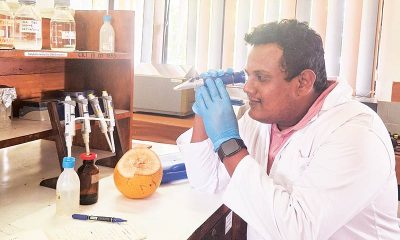
 Life style5 days ago
Life style5 days agoKing of coconuts heads for a golden future
-
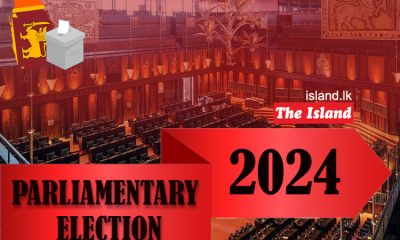
 Latest News7 days ago
Latest News7 days agoColombo district preferential votes announced
-
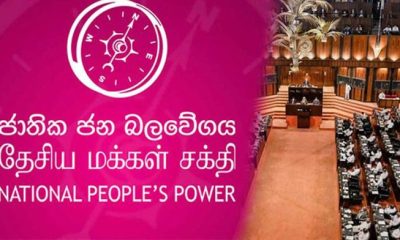
 News4 days ago
News4 days agoNPP appoints two defeated candidates as NL MPs
-
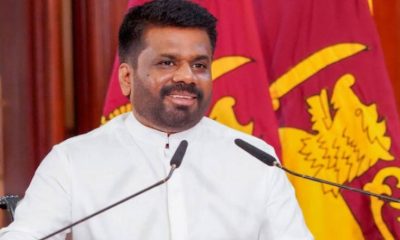
 News6 days ago
News6 days agoPresident warns his party: “We will fail if we view power as an entitlement to do as we please”
-
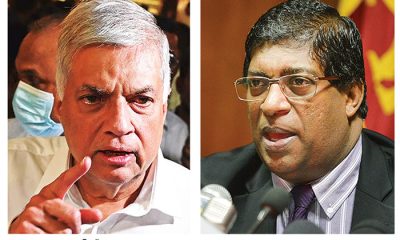
 News3 days ago
News3 days ago‘Gas Cylinder’ explodes; Ranil flays NDF Secy. for submitting Ravi’s name
-
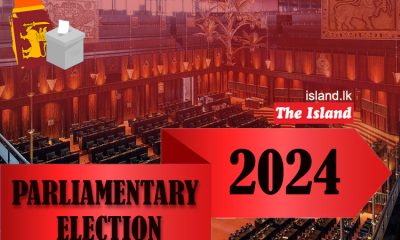
 Latest News7 days ago
Latest News7 days agoGampaha district: NPP 16, SJB 3
-

 Midweek Review2 days ago
Midweek Review2 days ago‘Ramayanizing’ Sri Lanka by Courtesy of SriLankan Airlines
-
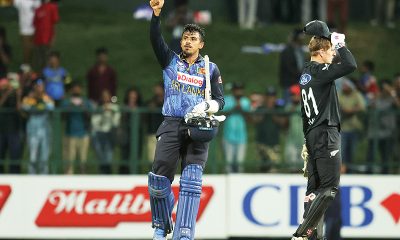
 Sports3 days ago
Sports3 days agoMaking batting compulsory for bowlers has worked – Theekshana











